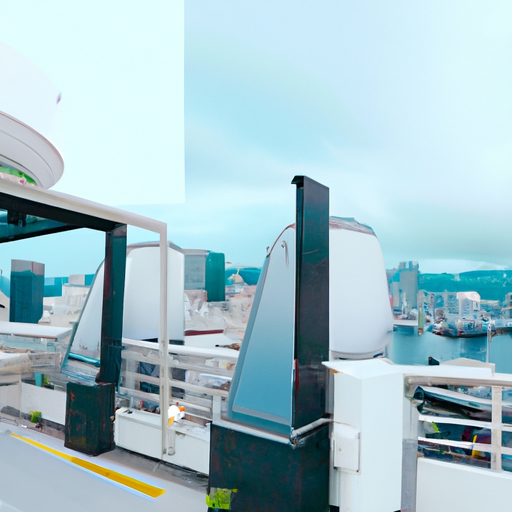
The Role of AI in Optimizing Hotel Room Pricing
AI to Revolutionize Hotel Room Pricing, Say Industry Experts
The hotel industry is constantly evolving, with new technologies and strategies being implemented to enhance the guest experience. One area that has seen significant advancements in recent years is hotel room pricing. Traditionally, hoteliers have relied on manual processes and intuition to set room rates, but now, industry experts are predicting that artificial intelligence (AI) will revolutionize this aspect of the business.
So, what exactly is the role of AI in optimizing hotel room pricing? AI algorithms are designed to analyze vast amounts of data, including historical booking patterns, competitor rates, and market demand. By processing this information, AI can provide hoteliers with valuable insights and recommendations on how to set the most competitive and profitable room rates.
One of the key advantages of using AI for pricing optimization is its ability to adapt in real-time. Unlike manual processes, AI algorithms can continuously monitor market conditions and adjust rates accordingly. For example, if a sudden surge in demand occurs due to a local event or a change in travel trends, AI can quickly identify this and suggest increasing room rates to maximize revenue. Similarly, if there is a decrease in demand, AI can recommend lowering rates to attract more bookings.
Another benefit of AI in pricing optimization is its ability to consider multiple factors simultaneously. Human revenue managers may struggle to analyze and weigh various variables, such as seasonality, day of the week, and even weather conditions. AI algorithms, on the other hand, can effortlessly process all these factors and provide accurate pricing recommendations based on a comprehensive analysis.
Furthermore, AI can also help hoteliers identify pricing patterns and trends that may not be immediately apparent to humans. By analyzing historical data, AI algorithms can uncover correlations between different variables and identify hidden patterns that can be leveraged to optimize pricing strategies. For example, AI may discover that certain room types are more popular among business travelers during weekdays, allowing hoteliers to adjust rates accordingly and maximize revenue during those periods.
While AI can provide valuable insights and recommendations, it is important to note that human expertise is still crucial in the pricing optimization process. AI algorithms are only as good as the data they are fed, and human revenue managers play a vital role in ensuring that the data is accurate and relevant. Additionally, human judgment is necessary to consider external factors that AI may not be able to account for, such as local events or special promotions.
In conclusion, AI is set to revolutionize hotel room pricing by providing hoteliers with valuable insights and recommendations based on comprehensive data analysis. Its ability to adapt in real-time, consider multiple factors simultaneously, and uncover hidden patterns makes it a powerful tool for optimizing pricing strategies. However, it is important to remember that human expertise is still essential in the process. By combining the power of AI with human judgment, hoteliers can unlock the full potential of pricing optimization and enhance the overall guest experience.
How AI Algorithms Can Enhance Revenue Management in the Hotel Industry

AI to Revolutionize Hotel Room Pricing, Say Industry Experts
The hotel industry is constantly evolving, with new technologies and strategies being implemented to enhance the guest experience and increase revenue. One such technology that is gaining traction in the industry is artificial intelligence (AI). According to industry experts, AI algorithms have the potential to revolutionize hotel room pricing and revenue management.
Traditionally, hotel room pricing has been determined based on a variety of factors such as demand, seasonality, and competition. Revenue managers would analyze historical data and make pricing decisions based on their experience and intuition. However, this approach is often time-consuming and can lead to missed opportunities for maximizing revenue.
This is where AI algorithms come into play. By leveraging the power of machine learning, AI algorithms can analyze vast amounts of data in real-time and make pricing decisions based on a multitude of factors. These algorithms can take into account not only historical data but also current market conditions, competitor pricing, and even guest preferences.
The use of AI algorithms in hotel room pricing can lead to more dynamic and personalized pricing strategies. For example, if a hotel is experiencing high demand for a particular room type, the algorithm can automatically increase the price to maximize revenue. On the other hand, if demand is low, the algorithm can lower the price to attract more guests and fill up the rooms.
Furthermore, AI algorithms can also take into account guest preferences and behavior. By analyzing data from previous stays, the algorithm can determine which amenities or services are most valued by guests and adjust pricing accordingly. For example, if a guest frequently orders room service, the algorithm can offer a discounted rate on room service to incentivize the guest to book again.
The implementation of AI algorithms in hotel room pricing can also lead to more efficient revenue management. Revenue managers can spend less time analyzing data and making pricing decisions manually, and instead focus on strategic planning and analysis. This can result in better revenue forecasting and more effective revenue management strategies.
However, it is important to note that AI algorithms are not a one-size-fits-all solution. Each hotel is unique, with its own set of challenges and goals. Therefore, it is crucial for hotels to work with AI providers that can customize the algorithms to meet their specific needs.
In addition, the implementation of AI algorithms should not replace human expertise and intuition. While AI can analyze vast amounts of data and make data-driven decisions, human revenue managers still play a crucial role in setting overall pricing strategies and making strategic decisions.
In conclusion, AI algorithms have the potential to revolutionize hotel room pricing and revenue management. By leveraging the power of machine learning, these algorithms can analyze vast amounts of data in real-time and make dynamic and personalized pricing decisions. However, it is important for hotels to work with AI providers that can customize the algorithms to meet their specific needs, and to ensure that human expertise and intuition are still valued in the decision-making process. With the right implementation, AI algorithms can enhance revenue management in the hotel industry and lead to increased profitability.
The Future of Hotel Room Pricing: AI-driven Solutions for Increased Profitability
AI to Revolutionize Hotel Room Pricing, Say Industry Experts
The future of hotel room pricing is set to be revolutionized by artificial intelligence (AI), according to industry experts. With the advancement of technology, hotels are increasingly turning to AI-driven solutions to optimize their pricing strategies and increase profitability. This article will explore how AI is transforming the hotel industry and the benefits it brings to hotel room pricing.
One of the key advantages of using AI in hotel room pricing is its ability to analyze vast amounts of data quickly and accurately. Traditional pricing methods often rely on manual analysis, which can be time-consuming and prone to human error. AI, on the other hand, can process large datasets in real-time, taking into account various factors such as demand, seasonality, and competitor pricing. This enables hotels to make more informed pricing decisions and respond to market changes promptly.
Moreover, AI-powered pricing solutions can also consider a wide range of variables that impact room rates. These variables can include historical booking patterns, customer preferences, and even external factors like weather conditions or local events. By taking into account these factors, AI algorithms can generate dynamic pricing recommendations that are tailored to each hotel’s unique circumstances. This level of personalization allows hotels to optimize their revenue by offering the right price at the right time to the right customer.
Another significant benefit of AI-driven pricing is its ability to forecast demand accurately. By analyzing historical data and patterns, AI algorithms can predict future demand levels with a high degree of accuracy. This forecasting capability enables hotels to adjust their pricing strategies accordingly, ensuring that they maximize revenue during peak periods and attract customers during low-demand periods. By optimizing occupancy rates, hotels can achieve higher profitability and reduce the risk of revenue loss due to underpricing or overpricing.
Furthermore, AI can also help hotels identify pricing opportunities and optimize revenue across different distribution channels. With the rise of online travel agencies and metasearch engines, hotels need to manage their pricing strategies across multiple platforms effectively. AI-powered solutions can analyze data from various sources and provide insights on how to optimize pricing across different channels. This ensures that hotels remain competitive in the online marketplace and maximize revenue from each booking.
In addition to revenue optimization, AI-driven pricing solutions can also enhance the guest experience. By offering personalized pricing and promotions, hotels can attract and retain customers. AI algorithms can analyze customer data and preferences to offer tailored packages and discounts, increasing customer satisfaction and loyalty. This personalized approach not only improves the guest experience but also helps hotels build long-term relationships with their customers.
In conclusion, AI is set to revolutionize hotel room pricing, bringing numerous benefits to the industry. From accurate data analysis and forecasting to personalized pricing and revenue optimization, AI-driven solutions offer hotels a competitive edge in today’s dynamic marketplace. By embracing AI technology, hotels can enhance their profitability, improve the guest experience, and stay ahead of the competition. As the hotel industry continues to evolve, AI will undoubtedly play a crucial role in shaping the future of hotel room pricing.


